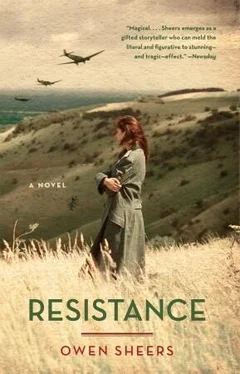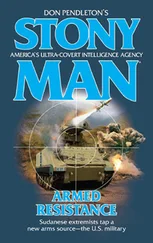Owen Sheers, born in Fiji in 1974 and brought up in Abergavenny, South Wales, was the 1999 winner of both an Eric Gregory Award and the Vogue Young Writer’s Award. His first collection of poetry, The Blue Book , was shortlisted for the Wales Book of the Year and the 2001 Forward Poetry Prize. His debut prose, The Dust Diaries , a nonfiction narrative set in Zimbabwe, was shortlisted for the Royal Society of Literature’s Ondaatje Prize and won the 2005 Wales Book of the Year. In 2004 he was writer in residence at the Wordsworth Trust and was selected as one of the Poetry Book Society’s 20 Next Generation Poets. His second collection, Skirrid Hill , won a Society of Authors’ Somerset Maugham Award. Sheers is currently a Fellow of the New York Public Library’s Dorothy and Lewis B. Cullman Center for Scholars and Writers. Resistance is his first novel, and he is working on a second. His website is www.owensheers.co.uk.
For those who would have
and those who did

In the months afterwards all of the women, at some point, said they’d known the men were leaving the valley. Just as William Jones used to forecast the weather by studying the sky or the formations of migrating birds, so the women said they’d been able to forecast the men’s sudden departure. After all, they were their men, their husbands. No one could read them like they could. So no surprise if they should see what was coming. That’s what the women said in the long silence afterwards.
But in truth none of them saw any change in the men’s behaviour. None of them knew the men were leaving and in many ways this was the hardest part of what happened. Their husbands left in the night. Just days after news of the invasion came crackling through on Maggie’s wireless, propped on a Bible on her kitchen table, the men, lit by a hunter’s moon, met at William’s milking shed and slipped out of the valley. Moving in single file they walked through the higher fields and up over the Hatterall ridge; an ellipsis of seven dark shapes decreasing over the hill’s shoulder, shortening to a last full stop and then nothing, just the blank page of the empty slope. The women, meanwhile, slept soundly in their beds. It was only in the morning when a weak September sun shone into the valley that they realised what had happened.
For Sarah Lewis it began in her sleep. The drag, rattle, and bark of the dogs straining on their chains was so persistent it entered her dreams. A ship in storm, the sailors shouting for help from the deck, their pink faces and open mouths obscured by the spray blown up the sides of the hull. Then the noise became Marley’s ghost, dragging his shackles over a flagstone floor. Clink, slump , clink, slump . Eventually, as the light brightened about the edges of the blackout curtain and Sarah surfaced through the layers of her sleep, the sound became what it was. Two dogs, urgent and distressed, pulling again and again on their rusty chains and barking, short and sharp through the constraint of their collars.
Without opening her eyes Sarah slid her hand across the sheet behind her, feeling for the warm impression of her husband’s body. The old horsehair mattress they slept on could hold the shape of a man all day and although Tom was usually up before her, she found comfort in touching the warm indentation of where he’d lain beside her. She stroked her palm over the thin cotton sheet. A few hairs poking through the mattress caught against her skin, hard and stubborn as the bristles on a sow’s back.
And there he was. A long valley where his weight had pressed the ball of his shoulder and his upper arm into the bed; a rise where his neck had lain beneath the pillow. She explored further down. A deeper bowl again, sunk by a protruding hip and then the shallower depression of his legs tapering towards the foot of the bed. As usual, Tom’s shape, the landscape of him, was there. But it was cold. Normally Sarah could still feel the last traces of his body’s heat, held in the fabric of the sheet just as the mattress held his form. But this morning that residue was missing.
With fragments of her dreams still fading under her lids, she slid her hand around the curves and indentations again, and then beyond them, outside the borders of his body. But the sheet was cold there too. The dogs below her window barked and barked, their sound making pictures in her mind’s eye: their sharp noses tugging up with each short yap, exposing the white triangles of their necks, flashing on and off like a warning. She lay there listening to them, their chains rising and falling on the cobblestones of the yard.
Tom must have been up early. Very early. Not in the morning at all but in the night. She turned on her side and shifted herself across the bed. The blankets blinked with her movement and she felt a stab of cold air at her shoulder. Pulling them tight about her neck, she lay there within the impression of her husband, trying not to disturb the contours of his map. Everything about her felt heavy, as if her veins were laced with lead. She was trying to think where Tom could be but the barks of the dogs were distracting her. Her mind was blurred, as buckled as a summer’s view through a heat haze. Why hadn’t he taken the dogs? He always took the dogs. Did he say something last night? She couldn’t remember. She couldn’t remember anything past their dinner. She opened her eyes.
In front of her the bedroom window was bright about the ill-fitting blackout cloth, a thin square outline of light burning into the darkened room. She blinked at it, confused. The window looked into the western flank of the valley, and yet there was light. Too much light. The sun must already be over the Black Hill on the other side of the house. She must have slept late. She never slept this late.
She rose quickly, hoping movement would dispel her mild unease. Tugging roughly on the heavy blankets, she made the bed, tucking their edges under the mattress. Then she plumped the pillows, shaking them as if to wake them. Brushing a few of Tom’s hairs from the one beside hers she paused for a second and stilled herself, as if the hairs might summon Tom himself. She listened, one hand still resting on the pillow. But there was nothing. Just the usual ticks and groans of the old building waking and warming, and outside, the dogs, barking and barking.
She pulled back the blackout cloth and opened the thin curtains behind it with both hands, unveiling the room to light. It was a bright, clear day. She closed her eyes against the glare. When she opened them again white spots shimmered over her vision. Drawing the sleeve of her nightdress over her wrist she wiped away the veneer of condensation from one of the small panes and looked down into the yard below. The dogs, both border collies, both bitches, sensed the movement above them and barked and strained harder in response, pulling their chains taut behind them. Sarah looked above the outhouse where they were tied. Over the top of its jigsaw slate roof she could see the lower paddock rising up to meet the sweep and close of the valley’s end wall. Except for a few grazing sheep it was empty, and so were the steep-sided hills on either side, their edges bald against the blue sky.
Turning away from the window, she pulled her nightdress over her head. Again she felt the cold air on her skin.
Читать дальше













